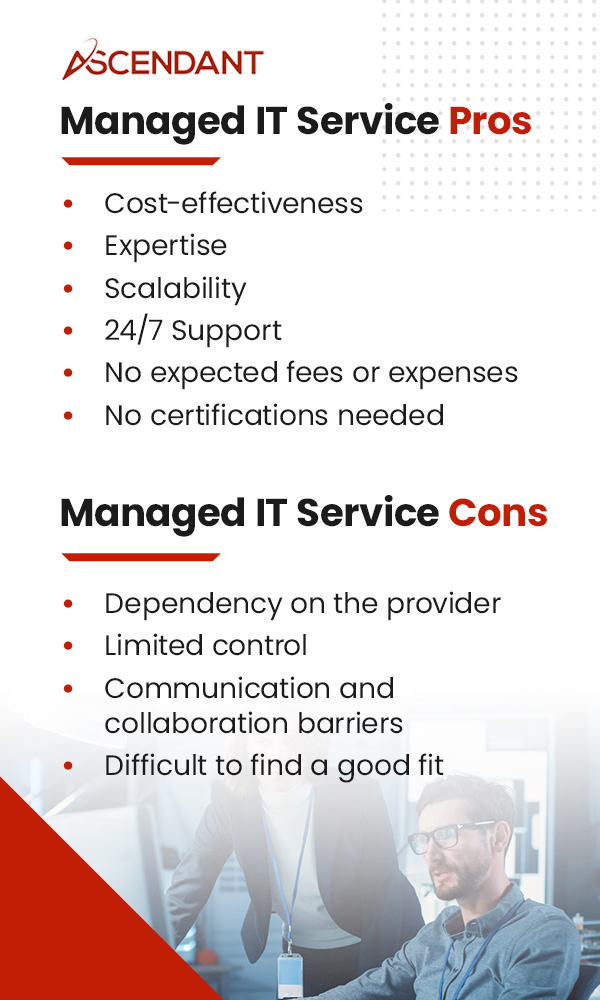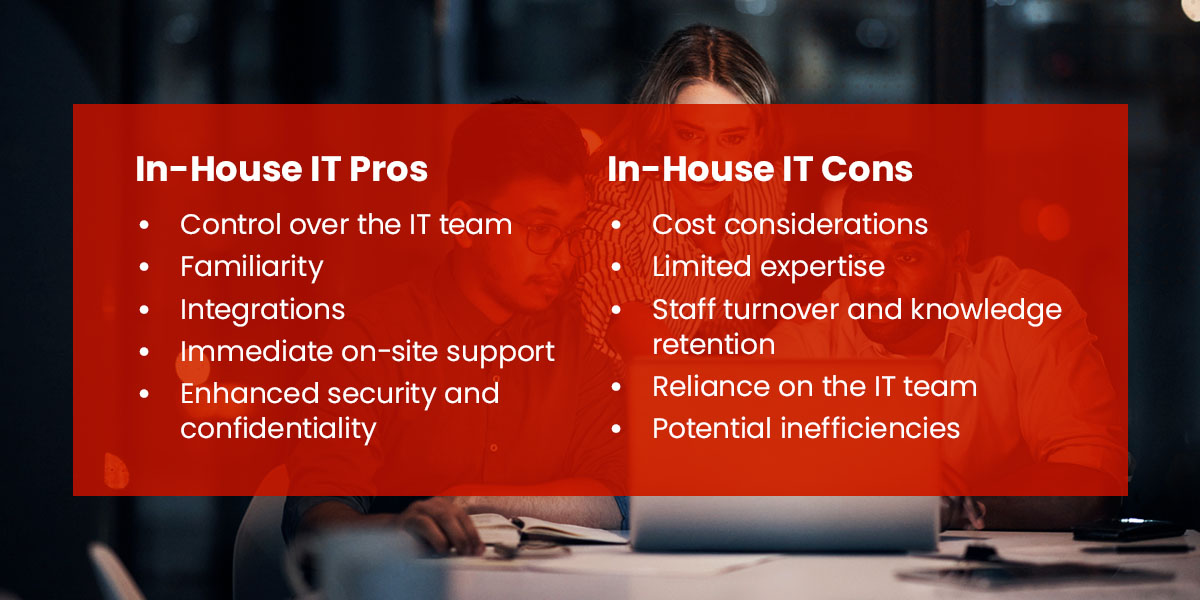Businesses rely heavily on technology to drive operations, enhance productivity and stay competitive. Two primary options to manage IT infrastructure effectively are utilizing managed IT services or building an in-house IT department. Both approaches have merits and considerations and choosing the right one for your business requires careful evaluation of various factors.
Managed IT services involve partnering with a third-party provider who assumes responsibility for managing your IT operations. This option allows businesses to leverage external expertise, industry best practices and scalable solutions. On the other hand, in-house IT entails building and maintaining an internal IT team, providing direct control and customization over technology infrastructure and operations. The question is, which will work better for you?
What Are Managed IT Services?
Managed IT services refer to outsourcing your company’s IT needs to a specialized provider. Instead of hiring an in-house IT team, you can rely on a team of experts from a managed service provider (MSP) to handle all your technology-related requirements. These services can cover many areas, such as network management, data backup and recovery, cybersecurity, software updates and technical support.
You gain access to a dedicated team of professionals with extensive knowledge and experience managing IT systems. A managed IT service provider stays current with industry trends, ensuring your technology infrastructure remains robust and secure. By leveraging their expertise, you can focus on core business activities while leaving the complexities of IT management to professionals.
Managed IT Service Pros
Having a managed it provider offers many advantages that make them an appealing choice for businesses of all sizes:
- Cost-effectiveness: Managed IT services are more cost-effective than maintaining an in-house IT department. You can eliminate expenses related to hiring and training IT personnel, purchasing and upgrading hardware and software and supporting infrastructure. Managed service providers typically offer flexible pricing models, allowing you to pay for only the services you need, which can lead to significant cost savings in the long run.
- Expertise: By partnering with a managed service provider, you gain access to a team of skilled and specialized professionals. These experts stay current with the latest technologies, best practices and industry trends, ensuring that your IT infrastructure is in capable hands. Their expertise can help you optimize your systems, streamline processes and make informed decisions about your technology investments.
- Scalability: Managed IT services offer the flexibility to scale your IT infrastructure as your business grows. With scalable solutions, you can avoid the hassle and expense of constantly upgrading and expanding an in-house IT setup.
- 24/7 Support: Technology issues can occur anytime and when they do, you need prompt assistance to minimize disruptions. Managed service providers typically offer round-the-clock support, ensuring you can access assistance.
- No expected fees or expenses: You can say goodbye to unexpected fees and costs that often arise with in-house IT management. Managed service providers operate on predictable pricing models, allowing you to budget more effectively. The costs are transparent and based on agreed-upon service levels, ensuring you clearly understand what you’re paying for.
- No certifications needed: Managed service providers employ professionals who already possess the required credentials and qualifications, saving you time and money associated with acquiring and maintaining certifications for your internal IT team.

Managed IT Service Cons
While managed IT services offer numerous advantages, consider some potential drawbacks before deciding. Here are a few cons associated with managed IT services:
- Dependency on the provider: When you opt for managed IT services, you depend on the chosen service provider for your technology needs. While this can be advantageous in accessing specialized expertise, it also means that you rely on an external entity to manage and maintain your IT infrastructure.
- Limited control: The service provider typically influences system upgrades, software implementations and IT strategies decisions. While they aim to make informed decisions in your best interest, some businesses prefer more control over their technology environment. It’s essential to ensure that the provider’s level of control aligns with your business requirements and comfort level.
- Communication and collaboration barriers: Since managed IT services involve an external provider, there can be communication and collaboration challenges. Misunderstandings or delays in communication may occur due to geographical distance, different time zones or differences in work cultures. Regular communication and feedback loops are crucial for building a solid working relationship.
- Difficult to find a good fit: The market is saturated with various providers offering different services, expertise and pricing models. It requires thorough research, careful evaluation and potential trial periods to identify a provider that aligns with your goals, values and IT requirements. Before committing, assess the provider’s track record, reputation, client reviews and service level agreements.
Despite these potential cons, many businesses find that the benefits of managed IT pros outweigh the drawbacks. Conducting a comprehensive analysis of your IT needs and evaluating multiple service providers can help you make an informed choice that best aligns with your business objectives.
What Is In-House IT?
In-house IT refers to establishing and maintaining an internal team of technology experts within your organization to handle all aspects of IT management. You have complete control over the entire IT ecosystem of your organization. You can hire IT professionals aligned with your business goals and culture, ensuring a strong understanding of your unique technological needs.
In-House IT Pros
In-house IT staff is an appealing choice for some businesses seeking maximum control and familiarity over their technology infrastructure. It offers several advantages:
- Control over the IT team: You have direct control over the hiring, training and managing of your IT personnel. You can build a team that aligns with your company’s values, culture and specific skill requirements. This control allows you to foster a strong sense of collaboration, loyalty and dedication among your IT professionals, contributing to enhanced productivity and a deep understanding of your business objectives.
- Familiarity: An in-house IT team develops a comprehensive understanding of your organization’s unique IT systems, processes and infrastructure. They become intimately familiar with your software applications, databases, network configurations and internal workflows. They can optimize your technology environment, integrate systems seamlessly and develop custom applications to enhance productivity and efficiency.
- Integrations: As the custodian of your IT infrastructure, your internal team can ensure that different software, databases and technologies work together seamlessly. They can develop and maintain integrations that facilitate data exchange, automate processes and improve overall system efficiency.
- Immediate on-site support: Having an in-house IT team means you have quick access to on-site support when technical issues arise. Efficient access can be especially advantageous for businesses that rely heavily on technology for their day-to-day operations.
- Enhanced security and confidentiality: In-house IT offers increased control and oversight over the security of your IT infrastructure and sensitive data. With direct supervision, you can promptly address security vulnerabilities and tailor security protocols to meet your needs. This level of control can be especially crucial for businesses handling sensitive customer information or operating in highly regulated industries.

In-House IT Cons
Depending on your organization’s size, budget and IT needs, a hybrid approach or leveraging managed IT services might provide a more optimal solution, as there are a number of cons of an in-house IT team, including:
- Cost considerations: Establishing and maintaining an in-house IT department can be a significant financial investment. You’ll need to consider expenses such as salaries, benefits, training, hardware and software purchases, infrastructure maintenance and ongoing professional development. These costs can quickly increase, particularly for small and medium-sized businesses with limited budgets. Additionally, in-house IT requires allocating resources to stay updated with evolving technologies, which can further increase expenses.
- Limited expertise: In-house IT teams may need more expertise and specialized knowledge. Finding and retaining professionals with a wide range of IT skills and expertise can be challenging, especially in niche areas or emerging technologies. Limited expertise can restrict your ability to leverage the latest advancements and best practices in IT. In-house teams may need help to keep up with rapidly evolving technologies, potentially leading to inefficiencies or missed opportunities for innovation.
- Staff turnover and knowledge retention: IT professionals often receive attractive job offers or seek new challenges, which can result in losing institutional knowledge and expertise within your organization. When key team members leave, it can disrupt projects, slow response times and require knowledge transfer to new team members.
- Reliance on the IT team: The success and smooth functioning of your technology infrastructure heavily rely on the performance and availability of your internal IT team. If key team members are unavailable due to illness, vacations or other reasons, it can impact the speed of response to critical issues and delay project timelines.
- Potential inefficiencies: Managing a complex technology environment can be demanding and internal teams may need help to allocate sufficient time and resources to tackle all IT-related tasks effectively. Balancing ongoing maintenance, upgrades, troubleshooting and strategic initiatives can strain resources and lead to delays or suboptimal outcomes. Inefficiencies can impact overall productivity and hinder the ability to quickly adapt to changing business needs.
Which Is Better for Your Business?
Determining whether managed IT services or in-house IT is better for your business depends on several factors. Let’s explore some key considerations to help you make an informed decision:
- Business needs and scalability: Assess your organization’s unique IT requirements and growth plans. Managed IT services can be beneficial if your business is in a growth phase or experiences fluctuating technology needs. The scalability and flexibility of managed services allow you to adapt and expand your IT capabilities as your business evolves.
- Cost considerations: Carefully evaluate the financial implications of both options. Managed IT services typically involve a predictable monthly fee, allowing for better budget forecasting and potentially reducing upfront costs. This model eliminates expenses associated with hiring, training and retaining IT professionals. Consider your budget, long-term cost projections and the value you place on control and customization when assessing the financial viability of each approach.
- Expertise and support: Consider the knowledge and support required for your business. Providers often employ teams of IT professionals who stay up to date with the latest technologies and best practices. If your organization needs a deep understanding of internal processes or highly customized solutions, in-house IT may be a better fit.
- Time and resource allocation: Evaluate the capacity of your organization to manage IT operations effectively. Consider whether you have the resources and expertise to handle IT operations efficiently while balancing other critical business responsibilities.
- Risk management and security: Assess your organization’s risk tolerance and security needs. Managed IT services often have robust security measures, data backups and disaster recovery plans. Providers prioritize security and adhere to industry standards and compliance regulations.
Ultimately, deciding between managed IT services and in-house IT depends on your business’s unique circumstances, goals and resources. Consider the trade-offs between control, expertise, scalability, cost and support to determine which option best fits your organization’s needs. In some cases, a hybrid approach that combines elements of both may offer the most effective solution.

Why Choose Ascendant?
If you are looking to switch to managed IT services, Ascendant Technologies, Inc. stands out as a trusted and reliable partner for small and medium-sized businesses. With Ascendant, you can take control of your IT infrastructure at a fraction of the cost of hiring an in-house team. Here’s why Ascendant is the right choice for your business:
- Comprehensive IT management: Ascendant offers a comprehensive range of managed IT services tailored to meet your company’s unique needs. With our expertise, you can focus on your core operations while we handle your technology needs.
- Smooth transition: If you’re working with another managed services provider in New Jersey or the surrounding areas, Ascendant ensures a seamless transition. Our experienced team will work closely with you to understand your existing IT environment and smoothly take over the management responsibilities. We prioritize a hassle-free transition, ensuring continuity and minimal disruption to your business operations.
- Robust security measures: Ascendant takes the lead in implementing robust security measures to safeguard your business.
- Dedicated support desk: Ascendant provides a full-time, fully-staffed support desk to address any IT issues or concerns your employees may encounter. Our responsive and knowledgeable support team can assist your staff, troubleshoot technical problems and provide prompt resolutions. We prioritize exceptional customer service to ensure your employees can focus on their work without IT disruptions.
- Strategic IT planning and recommendations: We proactively approach IT management. Our team will get to know your business and provide expert advice on technology improvements and upgrades. We strive to create a healthy network environment that supports all your business initiatives, enabling you to leverage technology to its full potential.
Contact Ascendant to Get a Quote for Managed IT Services
By choosing Ascendant, you gain a trusted partner who will transition your IT management responsibilities and provide proactive solutions to ensure your technology infrastructure’s efficiency, security and reliability. We aim to support your business initiatives and help you achieve a healthy network environment that drives growth and success.
Contact Ascendant Technologies, Inc. today to discuss your IT needs and request a quote. Experience the benefits of managed IT services with Ascendant and let us take care of your technology, so you can focus on what you do best – running your business.


